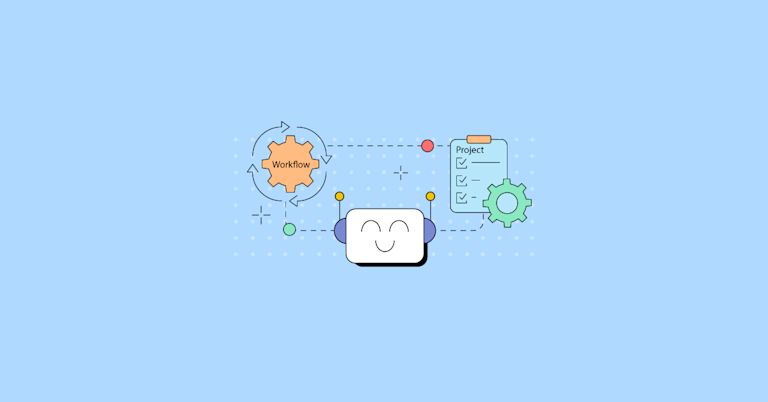A recent PMI study showed that 35% of projects fail. What if there was a technology that could help improve those outcomes, leading to less budget overages, on-time completions and more productive people? You’ve probably already guessed, the technology we’re talking about is AI. But it’s no longer a thing of the future – it’s already transforming how projects are managed today, so let’s see how it can also work for you
Gartner predicts that by 2030, 80% of project management tasks will be run by AI. Businesses are counting on it to boost project performance.
In this article, we’ll explore the growing role of artificial intelligence in project management, its current capabilities, limitations to consider, and look at how you can leverage AI in your project management platform or systems. We’ll also look at some examples along the way.
Understanding AI in project management
Artificial intelligence refers to software performing tasks that normally require human intelligence – such as visual perception, speech recognition, and decision-making. In the context of project management, AI enables automation of workflows, surfacing of insights from data, and optimization of processes, and benefits three key areas of project management.
Benefits of AI in project management
1. Productivity
In a 2023 study by Monday.com (a project management platform), more than half the respondents indicated that by using AI and automation, they could remove 5 hours of work from their work week, freeing up time for more strategic activities.
Here are some ways the use of AI contributes to these types of time savings:
- AI can automate repetitive administrative tasks like updating project docs and data entry.
- Intelligent AI assistants can handle meeting notes, status reports, and communication using generative AI to draft relevant content.
- Prioritization, scheduling and resource optimization via AI can improve team and project efficiency.
2. Collaboration
Notion, a collaborative document, project and communication platform, has already implemented generative AI into their offering. Use cases include summarizing meetings, coming up with starter content and more, all within a real-time, collaborative environment.
Notion and other AI-augmented project management tools offer some the following collaboration benefits:
- Real-time AI-powered coordination of tasks and communication between teams – an area where busy project team members often fall short.
- Centralized AI data analysis to provide insights into bottlenecks, dependencies, and team challenges.
- Generative AI to help keep teams aligned by summarizing docs and conversations.
3. Cost and time savings
According to Deloitte’s Global Cost Survey, using AI in project management can lead to an average cost saving of 20%. Savings like this can be attributed to factors like:
- Automation and optimization of workflows to reduce wasted efforts and eliminate redundancies.
- AI-powered accurate forecasting of budgets, schedules, and capacity to tighten spending and increase predictability.
- AI scheduling to assist in projects delivery on time and under budget.
Limitations and challenges of AI in project management
While the benefits are compelling, there are still limitations and challenges to consider when using AI in project management.
1. Data privacy and security
There are numerous concerns that exist around data privacy and protection when using AI within an organization. Sensitive company and customer data requires strong security. Also, many people are uncomfortable with the perception of AI acting as a "big brother", watching employee activities. To help overcome these issues, both proper governance and transparency need to be implemented, if it’s to become a useful and trusted tool in your business..
2. Implementation hurdles
According to KPMG’s Trust in Artificial Intelligence: Global Insights 2023 report, 42% of individuals fear AI will replace jobs in their area of work. It’s people that make companies, and their beliefs bleed into the workplace culture and outputs. Getting employee buy-in on AI adoption and any ensuing organizational change therefore requires thoughtful and respectful change management, if it’s going to succeed.
A further complication is the challenge of integrating AI with legacy enterprise systems and processes – this can prove more complex than initially thought, and a resolution may require customized solutions.
3. Input limitations of AI
AI does require ongoing human supervision, governance and input. It lacks generalized intelligence, contextual empathy and struggles with highly creative, strategic tasks as compared to how it excels at repetitive administrative work.
Plus, there are biases in the algorithms and data used to train them. If you feed it bias material, the likelihood is that those same biases will be reflected in the AI outputs. Oversight, editing, reviewing and reworking is therefore mandatory to ensure AI is not driving projects (or the information that decision-making is based on) in the wrong direction.
Bringing AI into your project management practice
Chances are, if you’re currently using a project management platform, it already has some AI capabilities, or AI is on its future upgrade roadmap. Check with your software vendor to see how you can leverage cutting edge AI features to boost your project teams’ productivity, collaboration, and reduce both project time and costs.
On the other hand, if you’re building a project management platform or maintaining an in-house solution, you’ll want to start thinking about useful ways you can bring AI to your users. Generative AI is the most recent development in the project management space, and it’s easier than you think to add to your platform.
TinyMCE’s WYSIWYG AI Assistant plugin lets your project team members write, summarize, and validate AI-assisted content for project documents in real time, within the editor interface, without having to leave your project management app. It’s the fastest and most cost-effective way to add generative AI to your project management platform.
The best part is, the AI Assistant plugin is incredibly easy to set up, and you don’t need a team of AI or machine learning engineers. To get started, all you need is an OpenAI API key. To take things further, you can customize the default AI prompts to suit your exact use case.
